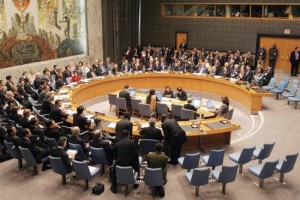Source: What’s in Blue (Insights on the work of the UN Security Council)
The 21st of January 2014, Council members are expected to receive a briefing in consultations from Miroslav Jenča, the Special Representative of the Secretary-General and head of the UN Regional Centre for Preventive Diplomacy for Central Asia (UNRCCA). As has become common practice with past semi-annual briefings on UNRCCA, the Council may issue a press statement in support of the centre’s ongoing work.
UNRCCA was established as a special political mission by the Department of Political Affairs on 10 December 2007. Its mandate, which was specified in a letter from the Secretary-General to the President of the Council on 7 May 2007, is to facilitate conflict prevention within the region (S/2007/279). Five states work closely with UNRCCA: Kazakhstan, Kyrgyzstan, Tajikistan, Turkmenistan and Uzbekistan.
This time, perhaps in reaction to the most recent development in terms of regional conflict prevention, Council members are likely to be interested in Jenča’s analysis of the border clash between Kyrgyzstan and Tajikistan on 11 January, which resulted in injuries to border guards on both sides. Kyrgyzstan has accused Tajikistan of conducting a premeditated military attack, including the use of mortars and grenade launchers. Just three days earlier, on 8 January, the two governments had reached an agreement on conducting joint border patrols. More than twenty years after the dissolution of the Soviet Union, nearly half of the 870 kilometer-long border between Kyrgyzstan and Tajikistan has yet to be mutually demarcated.
Jenča is also expected to update Council members on UNRCCA’s Programme of Action for 2012-2014 which outlines three key priorities for conflict prevention in Central Asia:
– Trans-boundary threats within the region such as drug trafficking, organised crime and terrorism;
– National developments which may have implications for regional stability, such as widespread violence in Kyrgyzstan in 2010; and
– Environmental degradation and the need for management of shared natural resources, particularly water.
Each of these priorities, as well as UNRCCA’s engagement with Central Asian states toward assisting stabilisation and reconstruction in Afghanistan, were discussed during the Council’s most recent consultations on UNRCCA on 15 July 2013 (SC/11061).
Council members may wish for a read-out of several conferences, meetings and workshops attended by Jenča in Central Asia since he last briefed Council members, including:
– A High Level Conference on Water Cooperation, 19-21 August (Dushanbe, Tajikistan);
– The Council of the Heads of States of the Shanghai Cooperation Organization, 12-13 September (Bishkek, Kyrgyzstan);
– “Afghanistan 2014” international conference convened by the Collective Security Treaty Organization, 10 October (Bishkek, Kyrgyzstan); and
– A workshop with religious leaders and institutions regarding conflict prevention and counter-terrorism, 20- 22 November (Almaty, Kazakhstan).
Council members are also likely to discuss with Jenča issues raised at the “Afghanistan 2014” conference, in particular with regard to the security implications for Central Asian states of the impending drawdown of International Security Assistance Force (ISAF) troops in Afghanistan. With the renewal of the UN Assistance Mission in Afghanistan (UNAMA) coming up in March, some members may wish to discuss how ISAF’s withdrawal could affect the work of UNRCCA and its coordination with UNAMA.
Also of interest to Council members may be the 20-22 November workshop held in Almaty which was the first event of a regional counter-terrorism project jointly managed by UNRCCA and the UN Counter-Terrorism Implementation Task Force.


